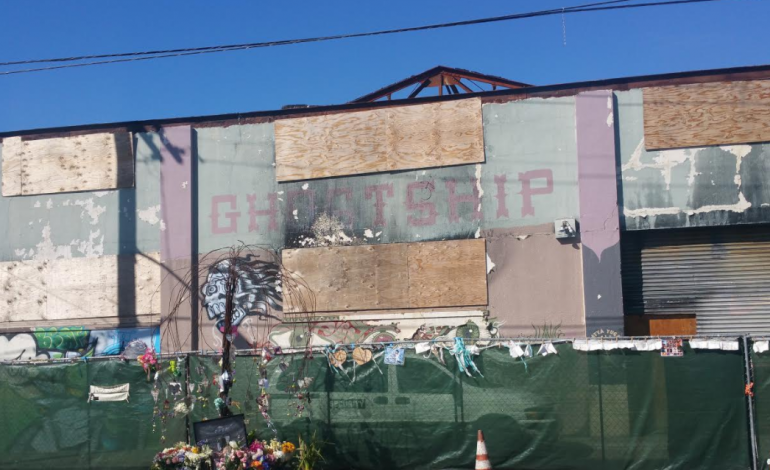

Over two years ago, on December 2, 2016, a fire broke out at an Oakland warehouse, killing over 36 people who were attending a DIY concert held by the residing Ghost Ship art collective and the 100% Silk record label. Two men, Ghost Ship’s master tenant Derick Almena and his assistant Max Harris, are being tried on involuntary man slaughter charges stemming from these casualties, and face life imprisonment if found guilty by a jury.
At the trial on Monday, one of the two men, Harris, denied that the collective held any real leadership roles, and that his own role as the collective’s artistic director had been overstated. According to Harris, he used the titles to “feel important,” and claimed that he was never paid as part of the collective.
“It was an autonomous place where everybody brought their insights to the table,” Harris stated according to Spin. “There was a lot of shared understanding among the residents as far as what’s appropriate behavior, appropriate conduct. Everyone understood what the space is.”
The warehouse was outfitted with many living spaces, flammable furniture, pianos and rugs during the time of the fire, which violated many of the warehouse’s permits at the time. Prosecutors also allege that the duo failed to install smoke detectors, fire alarms, sprinklers and other required safety equipment to comply with the building’s permit.
Despite these violations, a cause of the fire was never determined by fire inspectors; although prosecutors have asserted that an electrical failure could have set the blaze. Harris has used this point to defend himself, claiming that the landlord hired an unlicensed electrician and workers from an auto body shop next door to perform electrical work at the warehouse. He also claimed that he had to phone those auto body shop workers to replace the building’s fuses.
Although Almena and Harris are still facing trial, the building’s owner Chor Ng, who is linked to 17 different properties across the San Francisco Bay Area, has not faced any charges for the incident. Ng has denied the assertion that anyone lived in the warehouse.
This fire held a major impact over DIY spaces, many of which are often integral to a city’s culture and DIY music scenes. Movements such as punk culture exploded under these spaces, and continue to hold an important space for many artists and outsiders in their communities.
Cities such as Oakland, where rent spiked nearly 71 percent at the time of the warehouse fire have also led many tenants and leaseholders to either drastically increase their rental prices or resort to using illegal cost-cutting measures, such as outfitting a warehouse with illegal living spaces. This widespread gentrification may have also held an impact, as Ghost Ship offered drastically reduced rent compared to much of the city.
While some credit gentrification as improving a community, others such as Peter Moscowitz, claim that gentrification “kills cities,” by forcing out many underrepresented communities who often cannot afford spikes in rent. For others, such as the 36 victims of the Ghost Ship Warehouse fire, the city may have unintentionally killed them.
As Harris stated during the trial:
“I would have made sure my friends were not buried there.”
Photo Credit: Kellie MacDougall
